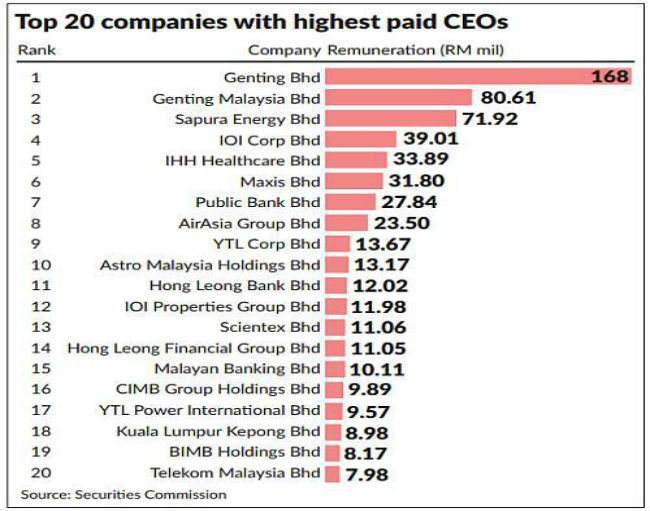Five GLCs among 20 listed firms with highest-paid CEOs
The Star, May 7, 2019
KUALA LUMPUR: Five government-linked companies (GLCs) and 10 family-controlled entities made up the top-20 listed companies on Bursa Malaysia with the highest-paid chief executive officers (CEOs) last year.
According to the Securities Commission’s (SC) inaugural Corporate Governance (CG) Monitor 2019, the remuneration of the top-20 highest paid CEOs in the country ranged from RM8mil to RM168mil.
The five GLCs with the highest-paid CEOs were healthcare firm IHH Healthcare Bhd, ; financial services companies Malayan Banking Bhd, CIMB Group Holdings Bhd and BIMB Holdings Bhd; and telco giant Telekom Malaysia Bhd.
Family-controlled companies with the highest-paid CEOs, on the other hand, were consumer products and services groups Genting Bhd and Genting Malaysia Bhd (GenM); plantation companies IOI Corp Bhd and Kuala Lumpur Kepong Bhd; utilities player YTL Corp Bhd and YTL Power International Bhd; financial services providers Hong Leong Bank Bhd and Hong Leong Financial Group Bhd; property player IOI Properties Group Bhd; and industrial products and services company Scientex Bhd.
The SC said while 100 listed companies were selected, data on CEO remuneration was only available for 84 listed companies, of which 25 were family-controlled, 28 were GLCs and the remainder were categorised as other listed companies.
Of the 84 listed companies, 65 had a market capitalisation of below RM40bil, with their CEOs earning RM10mil or less. Within this category were 17 family-controlled entities and 23 GLCs.
The CG Monitor 2019 noted that companies with a market capitalisation of more than RM40bil and with CEOs earning less than RM10mil were GLCs.
In contrast, companies with a market capitalisation of less than RM40bil and CEOs earning more than RM10mil were mostly family-controlled entities.
Overall, the median CEO remuneration ranged from RM1mil to RM7.98mil across 13 sectors.
The top-three sectors with the highest median CEO remuneration were telecommunications and media, followed by the financial services and utilities sectors. REITs recorded the lowest median for CEO remuneration.
In his speech read out by political secretary Tony Pua at the launch of CG Monitor 2019 here yesterday, Finance Minister Lim Guan Eng pointed out that some companies had CEOs who were paid very high remuneration – that is, 17 times more than the median CEO pay highlighted in the report – despite those companies having reasonably average market capitalisations.
He urged the SC to follow up on its analysis of CEO remuneration with a review of key pay ratios and wage levels of employees in listed companies in CG Monitor 2020.
“Corporate Malaysia needs to play its part to ensure that Malaysian workers earn a decent wage with good work environment,” Lim said.
Meanwhile, SC chairman Datuk Syed Zaid Albar said CG Monitor 2020 is expected to unveil findings on anti-corruption measures and key pay ratios of listed companies.
“The focus this year will be to review the anti-corruption measures of listed companies as part of the SC’s efforts to support the National Anti-Corruption Plan. Pursuant to the Budget 2019 announcement, the SC will also be looking at key pay ratios of listed companies,” Syed Zaid said.
“Findings from both reviews will be included in the 2020 edition of the CG Monitor,” he added.
According to CG Monitor 2019, which reviewed the performance for 2018, there were “positive levels” of adoption of a majority of the practices recommended in the Malaysian Code and Corporate Governance (MCCG).
Among the 36 best practices outlined in the MCCG, 27 had an adoption level of over 70%, the report noted. This means these practices were adopted by more than 70% of the 841 listed companies in Malaysia.
Syed Zaid said mid and small-cap companies were among the trailblazers in the adoption of the CG best practices such as disclosing the remuneration of senior management, introducing a nine-year tenure limit for independent directors, and having a wholly-independent audit committee.
However, he said, the report showed there were still 447 companies with long-serving independent directors on their boards, and some with a tenure of more than 30 years.
“Lengthy tenures are believed to prevent boards from introducing new skills and ideas to the running of the business,” Syed Zaid explained.
A refreshed board, he said, would help the company make improvements, while promoting new viewpoints and greater diversity.
The report revealed 164 listed companies had started exercising greater scrutiny on the retention of long-serving independent directors through the use of the two-tier voting process.
It added that 226 independent directors, with a tenure of more than 12 years, resigned and did not seek re-election after the introduction of the two-tier voting process.
On gender diversity, the CG Monitor 2019 noted that women participation on boards of the top-100 listed companies had increased to 23.7% last year from 16.6% in 2016.
In Malaysia, women accounted for 28% of senior management positions in all listed companies, higher than the Asia Pacific average of 23%.
“The percentage of women directors increased in the younger age groups, as women accounted for 15% of the 51-60 age group, compared to 43% in the 20-30 age group, suggesting a strong pipeline for gender diversity on boards in the future,” Syed Zaid said.

